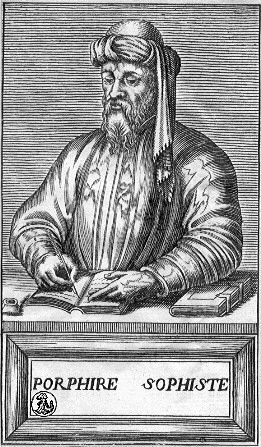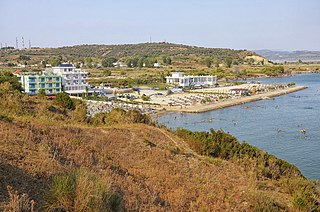Related Research Articles
Ammonius Hermiae was a Greek philosopher from Alexandria in the eastern Roman empire during Late Antiquity. A Neoplatonist,he was the son of the philosophers Hermias and Aedesia,the brother of Heliodorus of Alexandria and the grandson of Syrianus. Ammonius was a pupil of Proclus in Roman Athens,and taught at Alexandria for most of his life,having obtained a public chair in the 470s.
Damascius,known as "the last of the Athenian Neoplatonists",was the last scholarch of the neoplatonic Athenian school. He was one of the neoplatonic philosophers who left Athens after laws confirmed by emperor Justinian I forced the closure of the Athenian school in c. 529 AD. After he left Athens,he may have sought refuge in the court of the Persian King Chrosroes,before being allowed back into the Byzantine Empire. His surviving works consist of three commentaries on the works of Plato,and a metaphysical text entitled Difficulties and Solutions of First Principles.
Chrysanthius of Sardis was a Greek philosopher of the 4th century AD who studied at the school of Iamblichus.
Marinus was a Neoplatonist philosopher,mathematician and rhetorician born in Flavia Neapolis,Palaestina Secunda. He was a student of Proclus in Athens. His surviving works are an introduction to Euclid's Data;a Life of Proclus,and two astronomical texts. Most of what we know of his life comes from an epitome of a work by Damascius conserved in the Byzantine Suda encyclopaedia.

Porphyry of Tyre was a Neoplatonic philosopher born in Tyre,Roman Phoenicia during Roman rule. He edited and published The Enneads,the only collection of the work of Plotinus,his teacher.
Glen Warren Bowersock is a historian of ancient Greece,Rome and the Near East,and former chairman of Harvard’s classics department.

Hypsistarians,i.e. worshippers of the Hypsistos,and similar variations of the term first appear in the writings of Gregory of Nazianzus and Gregory of Nyssa,about AD 374. The term has been linked to a body of inscriptions that date from around 100 AD to around 400 AD,mostly small votive offerings,but also including altars and stelae,dedicated to Theos Hypsistos,or sometimes simply Hypsistos,mainly found in Asia Minor and the Black Sea coasts that are today part of Russia.
Michael Frede was a prominent scholar of ancient philosophy,described by The Telegraph as "one of the most important and adventurous scholars of ancient philosophy of recent times."
Asclepiodotus of Alexandria was a Neoplatonic philosopher who lived in the second half of the 5th century. He studied under Proclus in Athens,but eventually moved to Aphrodisias,where he maintained a philosophy school jointly with another man also called Asclepiodotus,whose daughter,Damiane,he married. Asclepiodotus also taught Damascius,who describes him in disparaging terms,in part because of his disregard for oracular lore:
Asclepiodotus' mind was not perfect,as most people thought. He was extremely sharp at raising questions,but not so acute in his understanding. His was an uneven intelligence,especially when it came to divine matters - the invisible and intelligible concept of Plato's lofty thought. Even more wanting was he in the field of higher wisdom - the Orphic and Chaldean lore which transcends common sense.

Saturninius Secundus Salutius was a Roman official and Neoplatonist author. A native of Gaul,he had a successful career as a provincial governor and officer at the imperial court,becoming a close friend and adviser of the Emperor Julian. Salutius was well versed in Greek philosophy and rhetoric,and had a reputation for competence and incorruptibility in office. He authored a Neoplatonic religious treatise titled On the Gods and the Cosmos,in support of Julian's pagan reaction against Christianity.
Pamprepius was a philosopher and a pagan poet who rebelled against the Eastern Roman Emperor Zeno.

Nartë is a community in VlorëCounty. At the 2015 local government reform it became part of the municipality Vlorë. It is situated northwest of the city of Vlorë. It is predominantly inhabited by ethnic Greeks who speak a unique northern Greek dialect,as well as Albanian.

Zvërnec is a community in VlorëCounty,Albania. At the 2015 local government reform it became part of the municipality Vlorë. It is situated northwest of the city of Vlorë. It is inhabited by ethnic Greeks who speak a unique northern Greek dialect,as well as Aromanians.
Theodora of Emesa was a member of an intellectual group of neoplatonists in late fifth and early sixth century Alexandria,and a disciple of Isidore. Damascius dedicated his Life of Isidore,also known as the Philosophical History,to Theodora,having written it at her request.
Simon Charles Robert Swain,FBA,is a classicist and academic. Since 2000,he has been Professor of Classics at the University of Warwick,where he has also been Pro-Vice-Chancellor for Arts and Social Sciences since 2014.
Mardonius,also spelled Mardonios,was a Roman rhetorician,philosopher and educator of Gothic descent. Mardonius was the childhood tutor and adviser of the 4th century Roman emperor Julian,on whom he had an immense influence.
Julian (Iouliane) Chrysostomides was a Greek historian of Istanbul. She lectured at Royal Holloway,University of London for nearly 30 years,and was instrumental in establishing it as a centre of Byzantine studies. She served for ten years as director of the Hellenic Institute at Royal Holloway,University of London,transforming it into a centre for interdisciplinary research into Greek and Byzantine history.
Severianus of Damascus was a Roman pagan politician who served under the emperor Marcian (450–457).
Dimitris Krallis is a Greek historian who is Professor of Humanities and Director of the SNF Centre for Hellenic Studies at Simon Fraser University.

Dimitris Plantzos is a classical archaeologist and writer,Professor of Classical Archaeology at the National and Kapodistrian University of Athens. He specializes in Greek art and archaeology,archaeological theory,and contemporary and modern receptions of classical culture.
References
- ↑ Stroumsa, Guy G. (2016). "Review of: Mutations of Hellenism in Late Antiquity. Variorum collected studies series, CS 1052". Bryn Mawr Classical Review. ISSN 1055-7660.
- ↑ Karl-und-Gertrud-Abel Stiftung. Tagung (17th : 2014 : Zurich, Switzerland) (2017). Philosophia in der Konkurrenz von Schulen, Wissenschaften und Religionen zur Pluralisierung des Philosophiebegriffs in Kaiserzeit und Spätantike : Akten der 17. Tagung der Karl und Gertrud Abel-Stiftung vom 16.-17. Oktober 2014 in Zürich. Riedweg, Christoph. Boston. pp. ix. ISBN 9781501514296. OCLC 1010583316.
{{cite book}}: CS1 maint: location missing publisher (link) CS1 maint: numeric names: authors list (link) - ↑ Athanassiadi, P. (1985). Στο Σύνορο του Ευφράτη. Athens: Domos.
- ↑ Athanassiadi, Polymnia (1976). An emperor and Hellenism : studies in the thought and action of the Emperor Julian. Unpublished DPhil thesis, University of Oxford.
{{cite book}}: CS1 maint: location missing publisher (link) - ↑ Athanassiadi, Polymnia (1993). "Persecution and response in late paganism: the evidence of Damascius*". The Journal of Hellenic Studies. 113: 1–29. doi:10.2307/632395. ISSN 2041-4099. JSTOR 632395. S2CID 161339208.